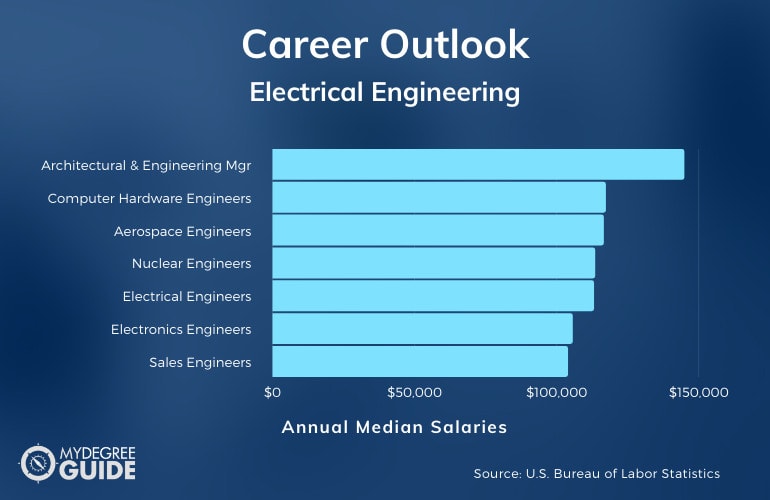It’s hard to imagine a better time to get an online masters in electrical engineering.

Our society is intrigued by smart cars and smart homes, clean energy grids, electric charging stations, robotics, wireless charging, and digital sensors and monitors.
Editorial Listing ShortCode:
If you have a background in engineering or have strong math and science aptitudes, you may want to consider how online graduate programs in electrical engineering can help pave the way for career opportunities in this incredible technology story.
Universities Offering Online Masters in Electrical Engineering Degree Programs & Courses
Methodology: The following school list is in alphabetical order. To be included, a college or university must be regionally accredited and offer degree programs online or in a hybrid format.
Arizona State University
Arizona State University offers a Master of Science in Engineering in Electrical Engineering online program.
The courses vary from 7.5 weeks to 15 weeks long. To graduate, the student must obtain 30 credit hours. To be eligible, students must have a bachelor’s degree in engineering, a GPA of 3.0, and a score of 156 on the GRE.
ASU is accredited by the Higher Learning Commission of the North Central Association of Colleges and Schools.
Colorado State University
Colorado State University offers both an online Master’s degree in Engineering with a specialization in Electrical Engineering and a Master’s of Science in Electrical Engineering. To graduate, the student must complete 30 credits. To be eligible for the program, applicants must have a bachelor’s degree with a GPA of 3.0 or higher.
Colorado State is accredited by The Higher Learning Commission.
Columbia University
Columbia University offers an online Master’s in Electrical Engineering. Students must receive 30 credits, with at least 15 credits coming from 6000 level or higher courses. To be eligible, applicants must have a relevant bachelor’s degree and a minimum GPA of 3.0 and submit GRE scores, 3 letters of recommendation, and a resume.
Columbia is accredited by the Middle States Commission on Higher Education.
Drexel University
Drexel University offers an online Master’s in Electrical Engineering. To graduate, students must complete 45 credits. A thesis is not required but can be completed for 9 credits. To be eligible for the program, applicants must have a bachelor’s degree in a related field with a GPA of at least 3.0.
Drexel University is accredited by the Middle States Commission on Higher Education.
Georgia Institute of Technology
The Georgia Institute of Technology offers an online Master of Science in Electrical and Computer Engineering.
To graduate, students must complete 30 credit hours. Students may choose between completing a thesis or not. Applicants must submit official transcripts from each institute they’ve attended, a personal statement, and a professional resume.
The Georgia Institute of Technology is accredited by the Southern Association of Colleges and Schools Commission on Colleges.
Johns Hopkins University
John Hopkins University offers an online Master of Electrical and Computer Engineering. The program offers seven areas of focus, including Signal Processing and Optics and Photonics.
To graduate, 10 courses must be completed within 5 years of starting the program. Applicants must have a bachelor’s degree with a GPA of 3.0 or higher and must submit all official transcripts.
The Johns Hopkins University is accredited by the Middle States Commission on Higher Education.
Mississippi State University
Mississippi State University offers an online Master of Electrical and Computer Engineering program. To graduate, students must complete 30 credits.
Students are given the option to complete a thesis or take 15 other graduate-level credits. To be eligible, applicants must have a bachelor’s degree, a GPA of 3.0 or higher, and GRE scores.
Mississippi State University is accredited by the Southern Association of Colleges and Schools Commission on Colleges.
North Carolina State University
North Carolina State University offers an online Master of Science in Electrical Engineering. To graduate, students must complete 31 credits within 6 years of enrolling while maintaining a minimum GPA of 3.0.
Applicants to the program must have a bachelor’s degree in electrical or computer engineering, a GPA of 3.25 or higher, and 3 letters of recommendation.
North Carolina State University is accredited by the Southern Association of Colleges and Schools Commission on Colleges.
Old Dominion University
Old Dominion University offers an online Master’s in Electrical and Computer Engineering. To graduate, students must complete 30 credits and a final project.
To be eligible, applicants must complete a bachelor’s degree in a relevant field with a GPA of 3.0 or higher. Up to 4 courses can be taken before being accepted into the program.
Old Dominion University is accredited by the Southern Association of Colleges and Schools Commission on Colleges.
Oklahoma State University
Oklahoma State University offers an online Master of Science in Electrical and Computer Engineering with the option to specialize in Electrical Engineering. The program is research based and requires students to complete a thesis. Applicants may be required to submit transcripts, GRE scores, and letters of recommendation.
Oklahoma State University is accredited by the Higher Learning Commission.
Purdue University
Purdue University offers an online Master of Science in Electrical and Computer Engineering. The program requires students to finish 30 credit hours and can usually be completed within a year.
Students can choose to focus on seven different areas in the program, including Automatic Control and Field and Optics. Applicants must have a relevant bachelor’s degree and must submit 3 letters of recommendation.
Purdue University is accredited by the Higher Learning Commission of the North Central Association of Colleges and Schools.
Stanford University
Stanford University offers an online Master of Science in Electrical Engineering. Students must complete 45 credits within 5 years of starting the program. To graduate, students must also do at least 3 credits worth of independent research and make a report on it. Applicants must apply online and may be required to take the GRE.
Stanford University is accredited by the Accrediting Commission for Senior Colleges and Universities of the Western Association of Schools and Colleges.
University of California – Los Angeles
The University of California—Los Angeles offers an online Master of Science in Engineering with a specialization in Electrical Engineering.
Students must complete 36 credits and choose between doing a capstone project and taking three written exams to graduate. To be eligible, applicants must have a bachelor’s degree in engineering, mathematics, or physics and a GPA of 3.0 or higher.
UCLA is accredited by the WASC Senior College and University Commission.
University of Florida
The University of Florida offers an online Master’s in Electrical and Computer Engineering. To graduate, students must complete 30 credits. Students may choose to complete a thesis or to complete a technical interview. To be eligible, applicants must have a minimum GPA of 3.5 and a minimum GRE score of 140.
The University of Florida is accredited by the Southern Association of Colleges and Schools Commission on Colleges.
University of Michigan – Dearborn
The University of Michigan—Dearborn offers an online Master of Science in Electrical Engineering. The program requires 30 credit hours to complete.
Classes take place in the evening to allow students to obtain their degrees part-time. Applicants must have a bachelor’s degree in electrical or computer engineering with a GPA of 3.0.
The University of Michigan – Dearborn is accredited by the Higher Learning Commission.
University of Southern California
The University of Southern California offers a Master of Science in Electrical Engineering. The program can typically be completed in 2 years and requires 28 units to be completed with a GPA of 3.0 to graduate.
To be eligible for the program, applicants must have a bachelor’s degree in an engineering field and must submit any official transcripts and a resume.
The University of Southern California is accredited by the Western Association of Schools and Colleges, the Senior College and University Commission.
University of Virginia
The University of Virginia offers an online Master of Engineering program. Students must complete 30 graduate-level credits to graduate and must maintain a 3.0 GPA at all times. Up to 15 credits can be transferred into the program.
Applicants must have a bachelor’s degree in engineering or a related field with a minimum GPA of 3.0.
The University of Virginia is accredited by the Commission on Colleges of the Southern Association of Colleges and Schools.
University of Wisconsin – Madison
The University of Wisconsin—Madison offers an online Master of Science in Electrical Engineering. A total of 30 graduate credits are required to graduate, and it usually takes up to 4 years to complete.
To be eligible for the program, students must first complete the Capstone Certificate in Power Conversion and Control program offered by the school and have a GPA of 3.0 or higher.
The University of Wisconsin – Madison is accredited by the Higher Learning Commission.
Villanova University
Villanova University offers an online Master of Science in Electrical Engineering. The program requires 30 credits and offers five areas of concentration. It also allows students to either complete a thesis or to substitute three credits of independent study.
To apply, students must have a relevant bachelor’s degree, a GPA of 3.0, and 2 recommendations.
Villanova University is accredited by The Middle States Commission on Higher Education.
Worcester Polytechnic Institute
The Worcester Polytechnic Institute offers an online Master’s in Electrical and Computer Engineering. To graduate, students must complete 10 courses. No thesis option is available for this program. To apply, applicants must have a bachelor’s degree in a related field with a GPA greater than 3.0.
WPI is accredited by the New England Commission of Higher Education.
Online Masters in Electrical Engineering Programs

Electrical engineering intersects with many products, technologies, and industries. You may want to consider which programs best match your experience, goals, and preferences.
You can also watch for how different accredited schools approach the following kinds of learning components:
- Survey courses. Your courses will typically include surveys of fundamental topics and concepts in the field. Survey courses also offer an opportunity for deeper exposure to a range of subfields.
- Specialized pathways. Programs can differ significantly in how they design course clusters. You might ask yourself what the offered clusters and pathways reveal about faculty expertise and how they connect with your own career interests.
- Immersive learning balanced by hands-on experiences. While specialization is the name of the game, broad fluency and knowledge across the larger field can help give you confidence and critical know-how as a professional after you graduate. Most programs push you to acquire a lot of technical knowledge, balancing this learning with hands-on activities that simulate on-the-job challenges.
- Capstone projects. Not all masters programs require a substantive capstone requirement, but many do. A master’s thesis or research project can be quite a different learning experience than a hands-on simulation. You may want to consider not only the challenges and time commitments involved but also what kind of benefit you want. Capstone projects are likely to differ by school.
Industry segments can include clean energy, computer engineering and microelectronics, microwave research, wireless and mobile connectivity, photo-electronics, and lasers. Electrical engineering also still encompasses the study of integrated circuits and systems.
Electrical and electronics engineers, based on their specialized training and expertise, can work in a number of fields and roles alongside mechanical, computer, industrial, or aerospace engineers.
Electrical Engineering Specializations

As you explore online programs, you might quickly learn which electrical engineering skill sets are in demand.
- Clean Energy. This specialization involves an array of clean energy production technologies as well as any number of development challenges related to efficient power generation, transmission, and storage.
- Computer Engineering. Whether it’s computer circuitry, computer networking hardware, advanced display technologies, the internet of things, or machine learning, these various areas of development, production, and innovation require electrical engineering expertise and applications.
- Integrated Circuits and Systems. Integrated circuits and systems are the nerve center of everything from industrial equipment, ordinary household appliances, smart devices, audio systems, and more. This specialization focuses on circuit components and architecture as well as the uses and material properties of diverse electrical components.
- Microelectronics. As more computing power is being engineered into smaller components, this highly specialized field concerns itself with semi-conductor development, production, and testing. Microelectronics has quickly evolved into a critical backbone of information-age innovations.
- Microwave Engineering. In this other highly specialized field, microwave and radio wave specialists apply their expertise in sophisticated signaling and communications applications for radios, TV, satellites, radar, and more.
You may want to compare how different electrical engineering graduate programs and course offerings fit into the larger career future you envision.
Electrical Engineering Careers & Salaries

Pursuing a master’s degree in electrical engineering can help you prepare for a challenging and rewarding career trajectory.
Even though a master’s degree isn’t required for some jobs, it can give you a competitive edge. A graduate degree can also equip you with the needed training to move into senior roles more confidently down the road.
According to the Bureau of Labor Statistics, many well-paid and technically challenging careers rely on professionals with electrical engineering skills and related engineering specializations.
| Careers | Annual Median Salaries |
| Architectural and Engineering Managers | $144,830 |
| Computer Hardware Engineers | $117,220 |
| Aerospace Engineers | $116,500 |
| Nuclear Engineers | $113,460 |
| Electrical Engineers, Research and Development | $113,050 |
| Electronics Engineers | $105,570 |
| Sales Engineers | $103,900 |
| Electrical Engineers, All | $98,530 |
| Bioengineers and Biomedical Engineers | $91,410 |
| Engineering Teachers, Junior Colleges | $81,460 |
It’s hard to know what the future will hold, but your Master of Science in Electrical Engineering could be a strategic way to make a quick career move into this challenging and lucrative field.
Where you end up in your career can often depend on what areas of knowledge and specialization you choose to learn. That said, electrical engineers work in well-paid roles across many industries.
Electrical Engineering Master’s Curriculum

Courses vary by school and tend to be clustered by areas of concentration, but you can expect many online masters in engineering programs to offer a range of courses similar to the ones described here:
- Electrical Engineering Core: This course is an overview of electronic theory and principles, including random processes, optimization concepts, and statistical inference.
- Microelectronics Systems: You’ll learn all about the underlying physical principles governing microelectronic circuitry and the fundamentals of circuit design and architecture.
- Integrated Circuits: Topics in this course include integrated circuit modeling, design, and testing as well as the design and testing of integrated systems technologies.
- Sensor Design and Manufacturing: This course explains how sensors are integrated with other micro-processing design mechanisms and how technicians test and calibrate sensors and sensor controls.
- Data Systems and Data Security: This course covers a range of electronic principles related to network architecture, wireless and mobile data, database security, and machine learning.
- Wireless and Microwave Electronics: You’ll learn about remote and wireless communications systems, broadband communications, and wireless network architectures and protocols.
- Bioelectricity and Bioelectronics: You’ll learn about the principles governing electrical signaling in living organisms and study biomedical systems and their industry applications.
- Renewable Energy: This course is an introduction to core concepts in power electronics and renewable energy power generation systems, technologies, and designs.
- Solar Power: You’ll learn about solar power plant design, solar energy efficiencies, and energy delivery systems and technologies.
- Photonics: This course cluster examines optical display technologies and specialized concepts for light-emitting diodes, high-resolution optic systems, and lasers.
Courses in electrical engineering tend to cluster around broad subfields of specialization. Schools will differ in how they construct learning pathways in their graduate programs.
Admissions Requirements

Most electrical engineering graduate programs require a bachelor degree from an accredited school. Some online graduate programs include enrollment options to help you fill gaps in prerequisite coursework.
Online electrical engineering master’s degree programs generally requires the following:
- Bachelor’s degree
- Specified prerequisite courses
- Relevant work history (when required)
- GRE or GMAT test scores (when required)
- A satisfactory college GPA
Most programs won’t require your bachelors degree to be in electrical engineering. They may require, though, that you have a strong technical background and college coursework in physical sciences, engineering, or mathematics.
Many schools provide admissions information online. You can also check with the school admissions office if you have any questions or need additional guidance.
Accreditation

Regional accreditation is important for many reasons. It ensures you that your selected school and degree program meet satisfactory standards for both academic quality and other academic services and resources.
Attending a fully accredited school is also a common qualification for certain types of financial aid. Regional accreditation also means you can be confident that other universities and prospective employers will honor your degree.
The Council for Higher Education Accreditation (CHEA) has information and resources to help you learn more about accreditation.
Financial Aid and Scholarships

Getting an advanced degree in a field with lots of professional applications and opportunities can help boost your earnings over the long term. So, seeking out financial assistance is worth it for many people, if they need it.
Many students rely on student loans to cover most of their program expenses. The terms of commitment can vary, so it’s always helpful to look over financial aid packages and loan options carefully.
Other forms of aid include federal or state education grants, need-based or merit-based scholarships, and work-study programs. If you’re already working in the field, you might qualify for employer-based tuition assistance.
If you anticipate applying for need-based aid, you can start by filling out the Free Application for Federal Student Aid (FAFSA).
What Does an Electrical Engineer Do?

Electrical and electronics engineers can specialize in many roles and industries. Electrical engineering work has a critical role to play in industries such as avionics, mechanical engineering and manufacturing, radar and navigation technologies, and defense-sector technologies.
Electrical engineers also play crucial roles in computer engineering, photonics, medical monitoring devices, and a wide range of broadcasting and communication technologies.
Key roles of electrical and electronics engineers include design and prototyping work, testing, monitoring electrical equipment installations, and helping to monitor and supervise the manufacture of electrical equipment and components.
Emerging growth industries that rely on electrical engineering expertise include robotics, artificial intelligence, and renewable energy.
How Much Does an Electrical Engineer Make?

An MS in Electrical Engineering could help qualify you for well-paid jobs in a variety of industries.
Positions in this field include electrical engineer, sales engineer, and aerospace engineer. According to the Bureau of Labor Statistics, the median annual salaries for these positions are $98,530, $103,900, and $116,500 respectively.
How much electrical engineers make can be impacted by their specialization, their work experience, the type of industry they’re employed by, and their geographic location. For example, the annual median salary for electrical engineers in the field of research and development is $113,050.
When determining which online masters degree program is the best fit for you, you may want to consider your present work experience, your engineering aptitudes, and your career aspirations.
What Can You Do with a Masters in Electrical Engineering?

What you can do with a masters in electrical engineering can largely depend on your training, degrees, specializations, and work experience. An electrical engineer might focus on specialized industry research and development work, perform academic research, or conduct government-funded research.
Some electrical engineers focus more on practical skills and applications. These can include rapid prototyping tools and methods, testing, and pragmatic design challenges related to embedded circuits, microprocessors, or wireless communication systems.
With the right training and background, you might also work in the field of power generation. Professionals in the field work alongside nuclear engineers, helping design new solar energy systems or working on clean energy transmission and delivery technologies.
How Long Does It Take to Get a Master’s in Electrical Engineering Online?

How long it takes to complete your MS in Electrical Engineering will depend on the school, program, and study options you choose.
Generally, professional masters programs at accredited schools can be completed in 1 to 2 years if you study full-time. Some online engineering degree programs are designed to help you learn part-time while you work. Attending part-time may extend your graduation timeline, though.
You can also look for online electrical engineering masters programs that require full-time study and are designed to get you out the door quickly, usually in 1 year. This kind of program is likely to follow an 8 week semester and require continuous enrollment year-round.
What’s the Difference Between Computer Engineering vs. Electrical Engineering?

If an electrical engineer specializes in micro-processing and embedded circuitry design and testing, then their work can overlap significantly with computer engineering.
Computer Engineers:
- Focus on computer design and functionality
- Design the integration of hardware and software systems
- Apply primary expertise in the design of computational systems and computer operating systems
Electrical and Electronics Engineers:
- Focus their design and testing expertise on electrical currents, fields, and micro-processing components
- May specialize in microchip design and manufacture
- Apply expertise in digital signals and signal processing, advanced electromagnetic theory, and semiconductors
Depending on electrical engineers’ specializations, they can work alongside other types of engineers as well.
What’s the Difference Between an Electrical vs. Mechanical Engineer?

Mechanical engineers deliver expertise in the design and manufacture of all kinds of mechanical equipment and machinery. For example, they can design and manufacture heavy machinery, weapons systems, cooling and heating systems, and ships, planes, and automobiles.
Mechanical Engineers:
- Design and integrate mechanical parts and components for larger systems
- Specialize in the properties and uses of materials used in the manufacture of heavy machinery and other mechanical equipment
- Develop expertise in mechanical systems and designs, such as power trains, hydraulic systems, motors, and braking systems
Electrical and Electronics Engineers:
- Design and test electrical power systems for mass power generation, for electrical motors, or for micro-processing circuitry
- Specialize in electrical currents and electrical circuitry design and testing
- Develop expertise in advanced electrical technologies, such as wireless signaling and communications and advanced digital signaling, sensing, and monitoring systems
Since many modern mechanical devices rely on electrical power systems and electrical control, signaling, or sensing technologies, electrical engineers will often work alongside mechanical engineers.
What’s the Difference Between Electronics Engineering vs. Electrical Engineering?

Electronics and electrical engineering are closely related areas of engineering expertise.
Electrical Engineers:
- Develop new electronic devices and systems
- Monitor safety, quality control, manufacture, and proper installation of electronic devices and systems
- Perform research and development of new power generation systems and technologies and develop guidelines for safety, applications, and efficiency standards
Electronics Engineers:
- Design and test specialized electronic components and embedded circuits for electrical signaling, control, sensing, and monitoring
- Develop and monitor testing systems for critical subcomponents within electrical devices
- Test or improve discrete electrical components for optimal performance, safety, or efficiencies
Electrical engineers focus more on holistic power generation designs and on the electrical specifications and design of complete electrical systems or mechanisms. By contrast, an electronics engineer will typically specialize more in the design of discrete, underlying electrical components and circuitry architectures.
Is a Masters in Electrical Engineering Worth It?
Yes, a masters in electrical engineering is worth it for many students. The Bureau of Labor Statistics is projecting 5% growth for electrical engineers over the next ten years.
An online electrical engineering graduate program can provide you with an immersive learning experience within a relatively short and predictable time frame. The knowledge and training you’ll receive in a fully accredited masters program could be an important step for launching or advancing your career.
Getting Your Electrical Engineering Online Master’s

An online masters program in electrical engineering can open up rewarding career opportunities in a variety of industries, similar to what a masters in software engineering online or one in chemical engineering or mechanical engineering can do.
If you’re currently working and building expertise on the job, there are many online programs out there with part-time study options that are designed to help keep you working while learning.
You might be surprised by the variety of accredited online electrical engineering degree programs and curriculum pathways, so you may want to explore your options.
Once you feel confident about which electrical engineering specialization is right for you, finding the right graduate program can put you on a path towards launching or advancing your career in this lucrative, growing field.
